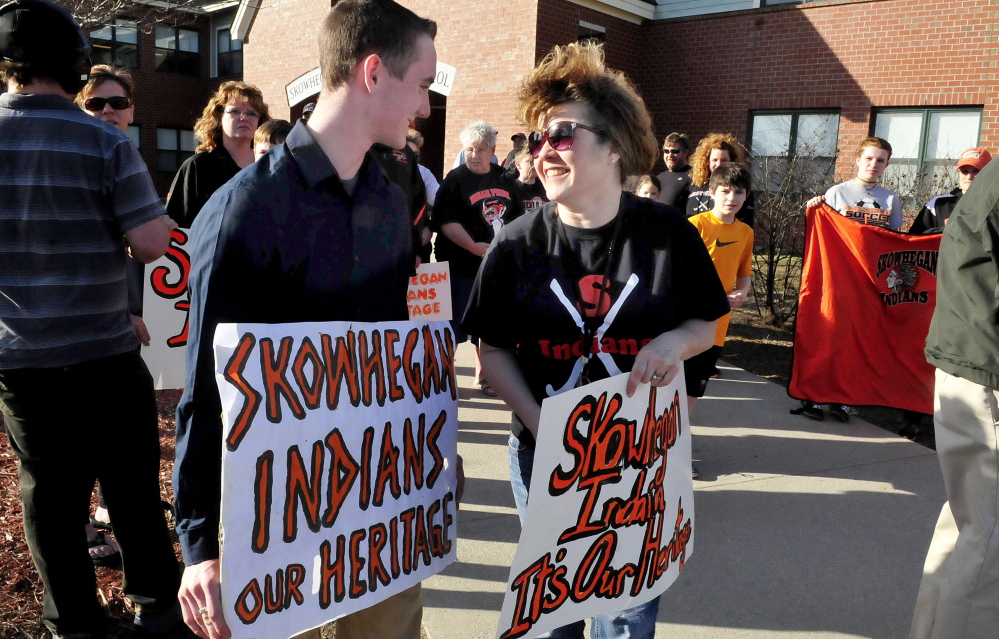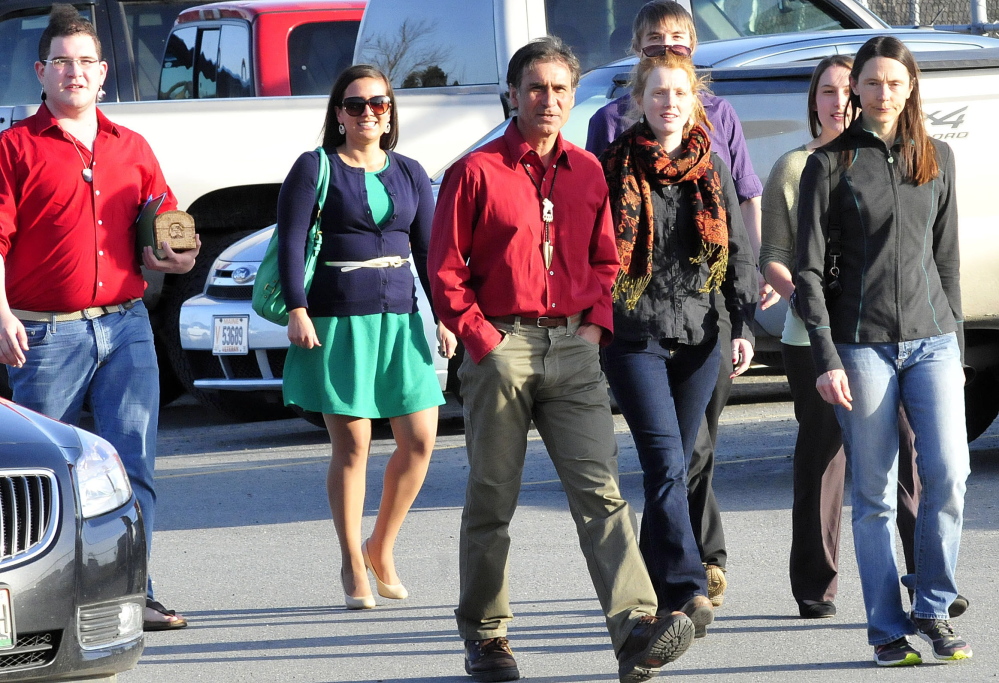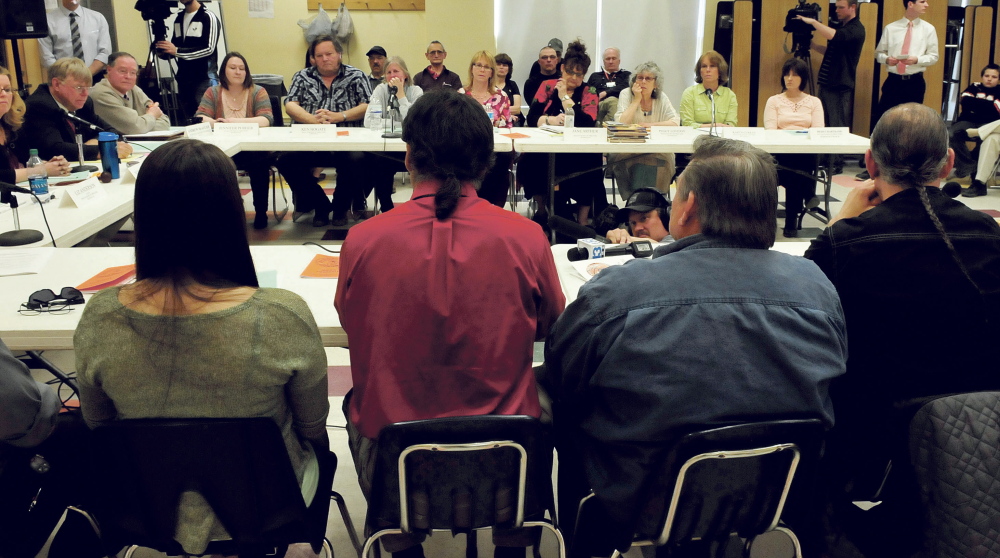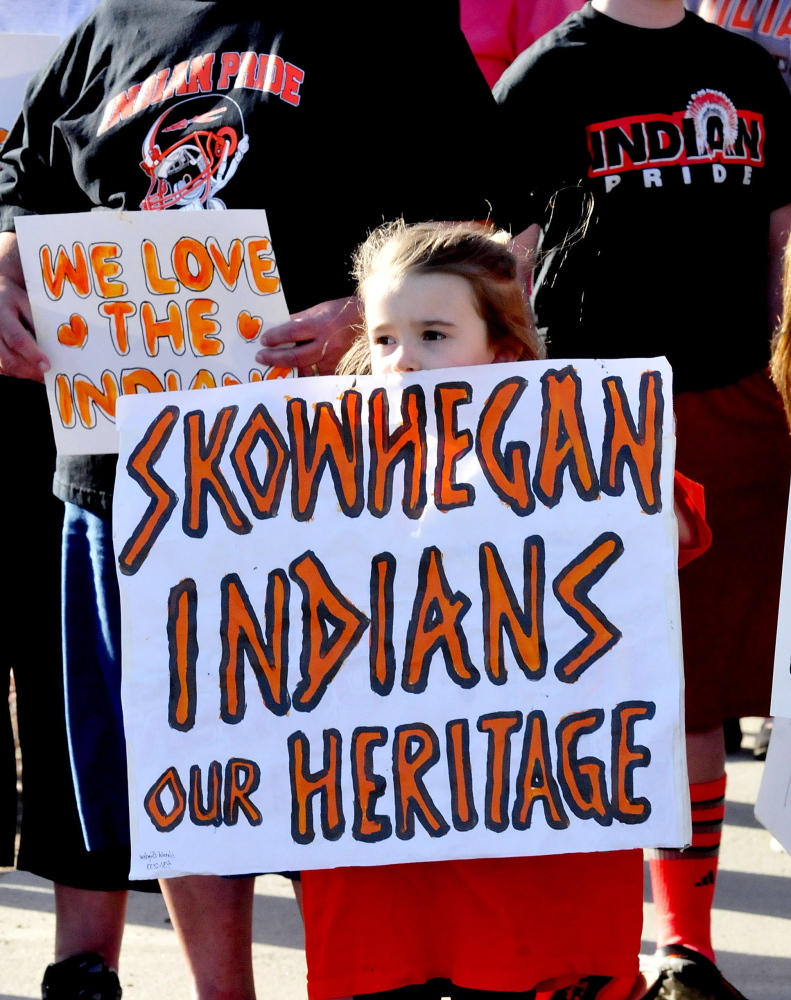SKOWHEGAN — Being an “Indian” does not mean slipping into a pair of moccasins and donning feathers during halftime at a football game.
Being an “Indian” does not mean being a sports mascot. It means being a person — a people — some of whom remember growing up on a reservation and suffering racism, only to find themselves at a meeting in a middle school cafeteria in 2015 challenging the image and the name of the Skowhegan Area High School sports teams’ nickname.
The Skowhegan Indians.
That was the message Monday evening from 10 representatives of the Penobscot, Passamaquoddy, Maliseet and Micmac Indian tribes — the Wabanaki federation — the federally recognized name for Maine’s four tribes meaning People of the Dawnland. One by one each of the tribal representatives spoke to the School Administrative District 54’s education policy program committee.
Federation members want the name changed, and they told the 11-member school committee why they want it changed. A school mascot hurts the identity of children — all children — the tribal leaders told a rapt committee who listened and understood.
“The identity of our children is worth talking about and worth fighting over and worth bringing up. That’s not a small thing, that’s a big deal to me,” said Maulian Smith, a Penobscot woman who grew up and still lives and works on Indian Island.
Smith said she told her young daughter where she was going Monday night and that they would be talking about the school’s “Indian” mascot.
“She said, ‘What’s a mascot?’ and I said, ‘You know, like black bears, panthers,’ and she goes, ‘Well they’re animals — Indians are not animals.’ She’s six years old. You don’t take a race of people and turn them into animals. It makes it easy to knock them down, to treat them like an object and not treat them like human beings. Indian mascots are wrong.”
At issue is not the town seal — an Indian spearing fish on the Kennebec River — or even the image of an Indian painted on the wall of the high school gymnasium, said Barry Dana, of Solon, former chief of the Penobscot Nation.
At the heart of the matter is using the name “Indians” as a sports mascot, a nickname or good luck charm. Dana and the other members of the four Indian tribes of Maine’s Wabanaki confederation want the name changed.
Those in the Skowhegan area who support continued use of the name say it is a way of respecting the people who lived for centuries on the banks of the Kennebec River, which runs through Skowhegan. Many also say it is an important school tradition.
Before the meeting a group of about 40 local people dressed in the orange and black of the Skowhegan high school sports teams assembled in a silent protest outside the middle school. They carried placards, banners and pennants saying “Skowhegan Indian Strong” and “Skowhegan Indians — Our Heritage.”
Nicole Carter, a 1991 Skowhegan graduate who was outside with her two young children, said she and her children are Skowhegan Indians.
“I was born and raised one, and I firmly believe we should be able to have our name and keep it. It’s our right,” Carter said. “How do you just forget what we’ve always been? I think it’s a tradition, and we should be allowed to keep it. We can’t always in life not be offended.”
The rally was inspired by Zachary Queenan, 17, a home-schooled Skowhegan senior and track and field athlete who started a Facebook page the day the Greater Bangor National Association for the Advancement of Colored People said that the Indian image used by Skowhegan as a sports mascot should be removed.
In Maine, high schools and junior high schools have dropped Native American nicknames in recent years, down from about 30 schools just 15 years ago.
Until last year, Skowhegan Area High School, Nokomis Regional High School of Newport, and Wells High School all used nicknames and imagery related to Native Americans that were considered offensive.
Wells and Nokomis are the Warriors. Skowhegan is the Indians.
Nokomis adopted a generic Warrior mascot, just as Wells has done. Wells began phasing out Native American imagery in 2014 to become a more neutral Warriors, without the classic “Indian” warrior as its school symbol.
Greg Potter, superintendent of Newport-based RSU 19, which includes Nokomis, said the American Indian image has not been dropped entirely at the high school, but has been incorporated along with other images in a kind of coat of arms to represent the district and its history, not a school sports mascot.
Tribal members Monday night, including Simon Nevin, cultural director of the Aroostook Band of Micmacs, said they came to Skowhegan seeking respect and truth. He said the history of the central Maine region is a “watered down version of what happened” during the Indian wars of the 1700s and into modern times.
Others, including Matt Dana II, a Passamaquoddy, and others said they have come to sporting events in Skowhegan and have had to tell their children that the image of the Skowhegan “Indian” is not their heritage, but they couldn’t explain why the image was there in the first place. Another, Roger Paul, a Motakomikak and Nekat Kuk, said recent studies released by the American Psychological Association show that use of Native American images and names for sports figures in the United States dehumanizes his people and elicit disrespect for the people who have lived here for centuries.
“We’re not gone — we’re still here,” Paul said. “We keep our traditions, and I came here to let you know that I am not honored.”
The first Maine school to change was Scarborough High School in 2001. The school dropped Redskins in favor of Red Storm. Husson University eliminated the Braves nickname and became the Eagles. In 2011 Wiscasset High School and Sanford High School eliminated the Redskins nickname. Wiscasset teams are now known as the Wolverines, while Sanford athletes are the Spartans.
In Old Town, the nickname Indians was dropped and Coyotes was adopted.
In Skowhegan — the last high school to consider renaming its sports mascot — the name change may not be so easy. The town’s name, “Skowhegan,” is an Abnaki word meaning “a place to watch.”
Discontent over the Indian mascot is not new for Skowhegan schools.
The school board’s Educational Policy and Program Committee voted in 2001 to keep the Indian name and propose a single American Indian symbol to represent the teams. The SAD 54 board had debated the issue for two years after receiving a letter from the American Indian Movement in 1999. The letter called the use of an Indian for the high school’s mascot offensive.
A committee of high school staff and students in 2001 also surveyed 800 students and staff and found the majority felt that the use of the name “Indians” was not disrespectful, although many of the American Indian symbols, including murals and a wooden sculpture in the cafeteria, did not reflect the tribes from the area.
Another problem was that a mascot head with oversized facial features had been used at athletic events. School board directors banned use of that head after parents complained.
The image of the American Indian on the rocks by the river dates back to a school art project in 1929 and is prominently displayed in murals inside the Skowhegan Opera House, on the town seal and on the wall of the high school.
But Dana, who is an active voice in promoting Penobscot culture and history in Maine, said the heritage and the mascot image are two different things.
Native Americans are people, Dana has said, not mascots.
School board committee members thanked the tribal representatives for sharing their feelings Monday night. Chairwoman Noella DesPres said the presentation was powerful. Other members, including Jane Arthur, Tim Downing and Jennifer Poirier, said they hoped continued education would foster a climate of understanding to resolve the matter once and for all.
The policy committee will report back to the main school board at a later date.
Doug Harlow — 612-2367
Twitter: @Doug_Harlow
Copy the Story LinkSend questions/comments to the editors.







Success. Please wait for the page to reload. If the page does not reload within 5 seconds, please refresh the page.
Enter your email and password to access comments.
Hi, to comment on stories you must . This profile is in addition to your subscription and website login.
Already have a commenting profile? .
Invalid username/password.
Please check your email to confirm and complete your registration.
Only subscribers are eligible to post comments. Please subscribe or login first for digital access. Here’s why.
Use the form below to reset your password. When you've submitted your account email, we will send an email with a reset code.